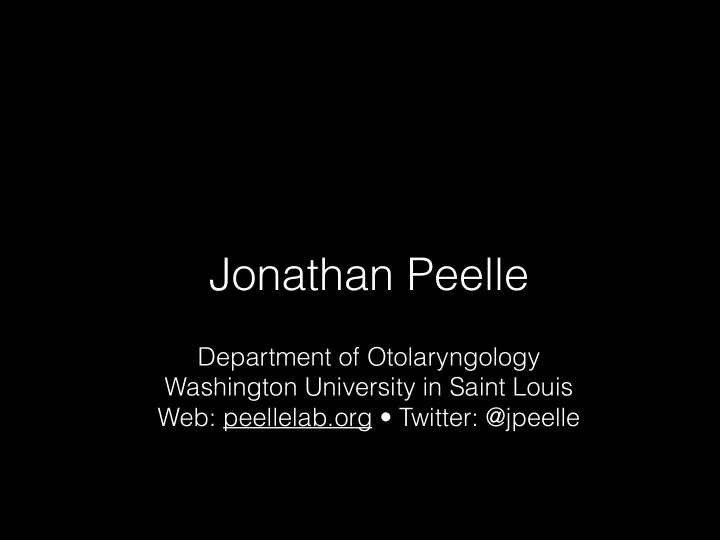

Jonathan Peelle Department of Otolaryngology Washington University in Saint Louis Web: peellelab.org • Twitter: @jpeelle
“listening effort” neurocognitive behavioral processing consequences acoustic challenge e.g., pupil dilation, physiological galvanic skin response, response stress hormones…
“listening effort” Outcome measure for assistive devices or interventions Clinical fitting of hearing aids or cochlear implants Evaluating processing/stimulation algorithms May identify mechanisms used by human listeners that may inform speech technology
Methods Experimental psychology (behavior, eyetracking) Structural MRI Functional MRI, optical imaging Electrophysiology (MEG/EEG/ECoG) Computational and modeling approaches
Peelle Lab Funding Private The Dana Foundation McDonnell Center for Systems Neuroscience Government “Pending” NIH (hopefully) (NIDCD, NINDS, NIA) NIA (Murray Grossman, Penn): Age, hearing loss, MRI NIDCD (Kristin Van Engen, Wash U): Accented speech
Areas of our research Cognitive aspects of Neural oscillations and Multisensory cues in speech comprehension temporal prediction speech comprehension
Sentence recognition task 32 sentences in quiet or multitalker babble (+15, +5 SNR) 64 sentences: “Did you hear this sentence before?” Memory worse for speech in noise than in quiet for both old and young adults verbal short-term memory
Normal completely intelligible 16 channel completely intelligible 4 channel moderately intelligible 1 channel 4 channel rotated unintelligible unintelligible
* Word report (% correct) 100 * 50 0 Normal 16ch 4ch 4ch rot 1ch Moderately intelligible Unintelligible Unintelligible Intelligible
IFG Brain activity pMTG highly intelligible moderately intelligible unintelligible p < .05, corrected Unprocessed > 1ch (unintelligible)
Word report (% correct) 100 Intelligibility is matched, but perceptual clarity (and thus listening effort) differ 50 0 Normal 16ch We predicted increased Intelligible neural activity for the degraded speech (16 channel) compared to normal speech
16ch > Normal speech Early < Late p < .05, corrected
Peelle, Johnsrude, & Davis (2010) Hickok & Poeppel (2007) Rauschecker & Scott (2009) p < .05, corrected
Neural similarity (RSA) Mur et al. (2013), Frontiers in Psychology
Areas for future research Incorporation of “cognitive” measures into assistive device design and fitting Focus on individual differences (e.g., understand what individual listeners’ brains are doing) Data, theory, and modeling Improving use of portable technology (e.g., smart phones) for speech processing Speech modification (podcasts, radio, phone calls…) Assessment Auditory training More interdisciplinary discussion!
Recommend
More recommend